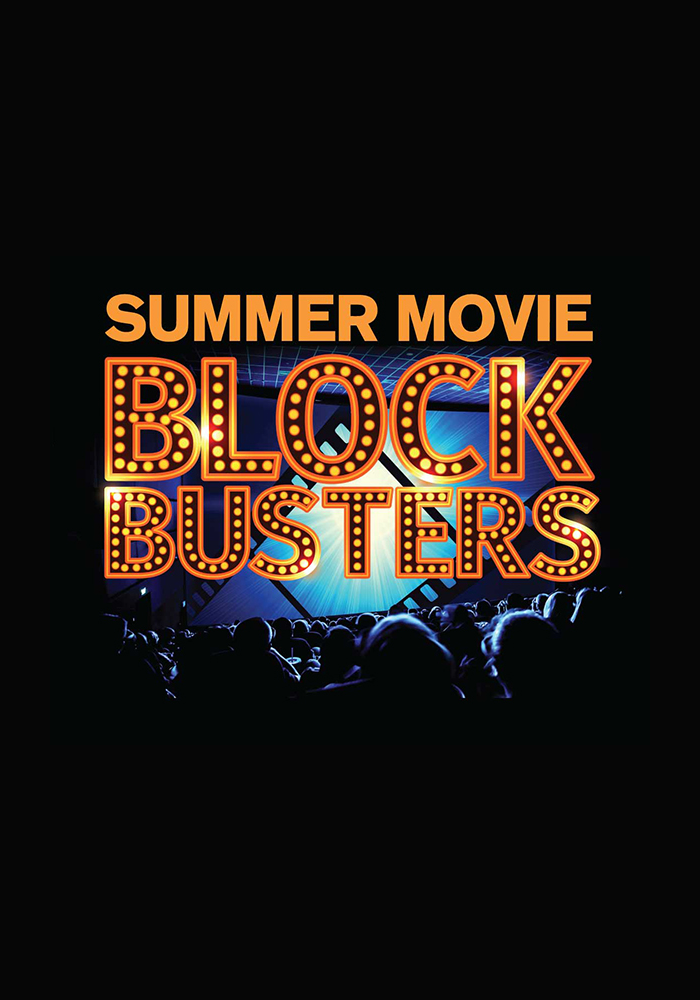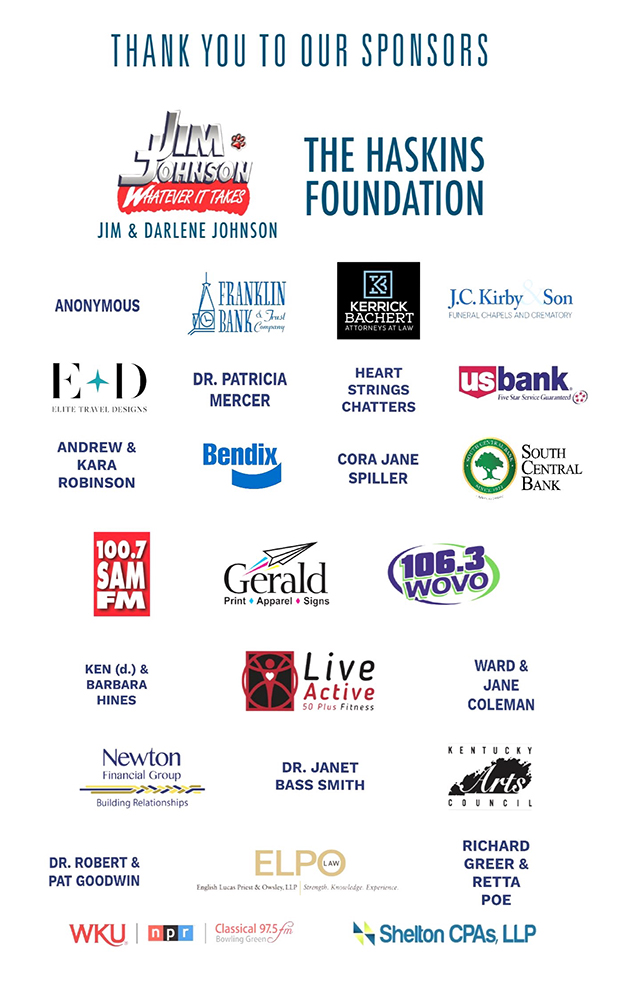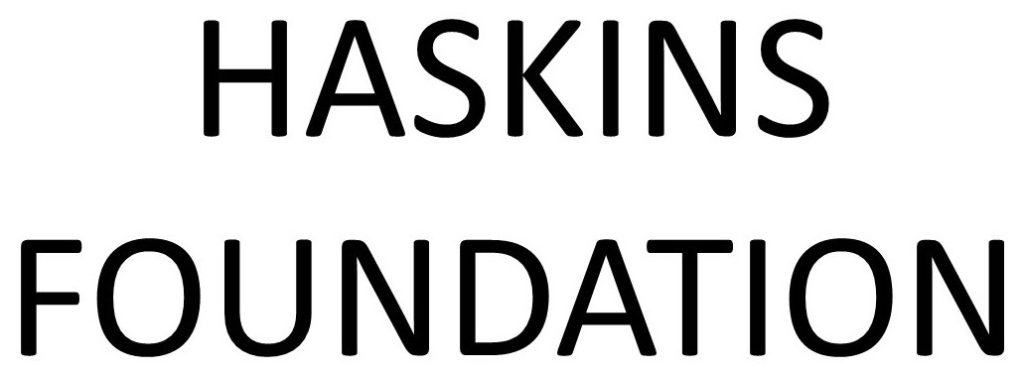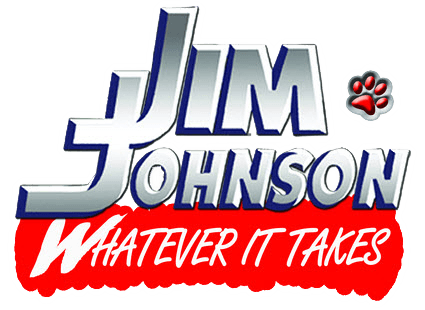
Orchestra Kentucky
Jeffrey Reed, conductor
Dick Tunney, guest conductor
Kirk Kirkland, tenor
Arr. Williams
Star Spangled Banner
Foster/Tunney
My Old Kentucky Home
Bernstein
The Great Escape March
Williams
The Shark Theme from Suite from Jaws
Silvestri
Back to the Future
Tiomkin/Palmer
Theme from High Noon
Newman
The Natural
Elfman/Bartek
Batman Theme
Mancini
Moon River
Casey/Custer
Grease Selections
Hamburg/Tyzik
Wizard of Oz Medley
Arr. Lowden
Armed Forces Suite
Tunney
Indivisible
Kirk Kirkland, soloist
Dick Tunney, guest conductor
Arr. Dragon America, the Beautiful
Sousa Stars and Stripes March
Arr. Lowden Armed Forces Suite
SEASON SPONSORED BY
RETRO & VARIETY SERIES SPONSORED BY
JIM & DARLENE JOHNSON
CONCERT CO-SPONSORED BY
DR. JANET BASS SMITH
VOLUNTEERS SPONSORED IN KIND BY

Click HERE to view our Donor List.
Program Notes by
Dr. Janet Bass Smith
Imagine seeing a movie with no background music; even the first movies, which had no sound track, had a pianist that played while the movie was rolling. Tonight we will hear some of the most famous soundtracks from your favorite movies, produced during the summer. Movie studios often release new movies during the summer to take advantage of summer audiences. The summer-blockbuster phenomena can be blamed on Steven Spielberg and "Jaws". Up until that time movies were really spread out throughout the year. For obvious reasons, you'll notice that most of the movies in the summer are targeted at young adults, who have the most disposable income for movies and aren't in school during the summer.
March, from The Great Escape, Elmer Bernstein: (1922-2004) Bernstein (not related to the famous conductor, Leonard Bernstein) was an American composer and conductor who composed 150 original movie scores, as well as scores for nearly 80 television productions. Examples of his widely popular and critically acclaimed works are scores to The Ten Commandments (1956), The Magnificent Seven (1960), To Kill a Mocking bird (1962), The Great Escape (1963), The Rookies (1972–76), Animal House (1978), Airplane! (1980), Heavy Metal (1981), Ghostbusters (1984), The Black Cauldron (1985), Cape Fear (1991), The Age of Innocence (1993), Wild Wild West (1999) and Far from Heaven (2002). Bernstein won an Oscar for his score to Thoroughly Modern Millie (1967) and was nominated for 14 Oscars in total. He also won two Golden Globe Awards, an Emmy Award, and was nominated for two Grammy Awards.
Suite from Jaws, John Williams (1932), an American composer, conductor, and pianist, is considered by many to be the most successful, versatile and prolific film composer in history. With a career spanning over six decades, he has composed some of the most popular, recognizable, and critically acclaimed film scores in cinematic history, including those of the Star Wars series, Jaws, Close Encounters of the Third Kind, Superman, E.T. the Extra-Terrestrial, the Indiana Jones series, the first two Home Alone films, Hook, the first two Jurassic Park films, Schindler's List, and the first three Harry Potter films. Williams has been associated with director Steven Spielberg since 1974, composing music for all but four of his feature films, theme music for four Olympic games, the theme for NBC Nightly News, and a piece for the Barack Obama inauguration. Williams has won 24 Grammy Awards, seven British Academy Film Awards, five Academy Awards, and four Golden Globes. With fifty-one Academy Award nominations Williams is, after Walt Disney, the second most nominated individual. In 2005, the American Film Institute selected Williams's score to 1977's Star Wars as the greatest American film score of all time. The soundtrack to Star Wars was additionally preserved by the Library of Congress into the National Recording Registry for being "culturally, historically, or aesthetically significant.” Williams was inducted into the Hollywood Bowl's Hall of Fame in 2000, and was a recipient of the Kennedy Center Honors in 2004 and the AFI Life Achievement Award in 2016. In addition to composing the score for eight of the top 20 highest-grossing films at the U.S. box office, Williams has also composed numerous classical concertos and other works for orchestral ensembles and solo instruments. He served as the Boston Pops' principal conductor from 1980 to 1993, and is currently the orchestra's laureate conductor.
Back To The Future, Alan Silvestri (1950) With a credit list of over 100 films Silvestri has composed some of the most recognizable and beloved themes in movie history, including Forrest Gump, Who Framed Roger Rabbit?, Contact, The Polar Express, and Captain America: The First Avenger. Known for his melodic rhythm and ability to match music to dramatic excitement, he has scored everything from children’s movies (Stuart Little, Night at the Museum) to action films (Predator, Young Guns II) to romantic and dramatic films (Father of the Bride series, What Women Want) to dramas (Flight). His efforts have been recognized with two Oscar Nominations, two Golden Globe nominations, three Grammy awards, two Emmy awards, and numerous International Film Music Critics Awards, Saturn Awards, and Hollywood Music in Media Awards.
High Noon Symphonic Suite, Dimitri Tiomkin (1894-1979) was a Ukrainian-born American film composer and conductor. Classically trained in St. Petersburg, Russia before the Bolshevik Revolution, he moved to Berlin, to New York City, and finally to Hollywood. He became best known for his scores for Western films, including Duel in the Sun, Red River, High Noon, The Big Sky, Gunfight at the O.K. Corral, and Last Train from Gun Hill. Tiomkin composed the score High Noon (1952). The theme song for High Noon was Do Not Forsake Me, Oh My Darlin' (The Ballad of High Noon). At its opening preview to the press, the film, which starred Gary Cooper and Grace Kelly, did badly. Tiomkin writes that "film experts agreed that the picture was a flat failure. The producers hesitated to release the picture." Tiomkin bought the rights to the song, released it as a single for the popular music market with singer Frankie Laine, and the record became an immediate success worldwide. Based on the song's popularity, the studio released the film four months later, with the words sung by country western star Tex Ritter. The film received seven Academy Award nominations and won four awards, including two for Tiomkin: Best Original Music and Best Song. Tiomkin received twenty-two Academy Award nominations and won four Oscars, three for Best Original Score for High Noon, The High and the Mighty, and The Old Man and the Sea, and one for Best Original Song for The Ballad of High Noon.
The Natural, Randall (Randy) Newman (1943) is an American singer-songwriter, arranger, and composer known for his Southern-affected singing style, early Americana-influenced songs, and various film scores. Born in Los Angeles to an extended family of Hollywood film composers, Newman began his songwriting career at age 17, writing hits for acts such as the Fleetwoods, Cilla Black, Gene Pitney, and the Alan Price Set. Since the 1980s, Newman has worked mostly as a film composer. He has scored nine Disney-Pixar animated films, including all four Toy Story films, A Bug's Life, Monsters, Inc., Cars, as well as Disney's James and the Giant Peach, and The Princess and the Frog. His other film scores include Ragtime (1981), The Natural (1984), Pleasantville (1998), Meet the Parents (2000), Seabiscuit (2003), and Marriage Story (2019). Newman has received twenty-two Academy Award nominations in the Best Original Score and Best Original Song categories and has won twice in the latter category, contributing to the Newmans being the most nominated Academy Award extended family, with a collective 92 nominations in various music categories. He has also won three Emmys, seven Grammy Awards and the Governor's Award from the Recording Academy. In 2007, he was recognized by the Walt Disney Company as a Disney Legend. He was inducted into the Songwriters Hall of Fame in 2002 and to the Rock and Roll Hall of Fame in 2013.
Batman Theme, Daniel (Danny) Elfman (1953) is an American composer, singer, songwriter, record producer, actor, and voice actor. He first became well known as the singer-songwriter for the new wave band Oingo Boingo in the early 1980s, and has since garnered international recognition for writing over 100 feature film scores, including Batman, Edward Scissorhands, Alice in Wonderland, and Dumbo; Raimi's Spider-Man, Spider-Man 2, and Oz the Great and Powerful; and Van Sant's Academy Award-nominated films Good Will Hunting and Milk. He wrote music for all of the Men in Black and Fifty Shades of Grey franchise films, the songs and score for the Burton-produced animated musical The Nightmare Before Christmas, and the themes for the popular television series Desperate Housewives and The Simpsons. Among his honors are four Oscar nominations, two Emmy Awards, a Grammy, six Saturn Awards for Best Music, the 2002 Richard Kirk Award, the 2015 Disney Legend Award, and the Max Steiner Film Music Achievement Award in 2017. Many superheroes have become inextricable from their themes, but few themes have become quite as beloved as ones associated with Batman. Each incarnation of The Caped Crusader has received a new musical accompaniment from a wide variety of composers.
Moon River, Henry Mancini (1924-1994), an American composer, conductor, arranger, pianist and flautist. Mancini was often cited as one of the greatest composers in the history of film, winning four Academy Awards, a Golden Globe, and twenty Grammy Awards, plus a posthumous Grammy Lifetime Achievement Award. His works include the theme and soundtrack for the Peter Gunn television series as well as the music for The Pink Panther film series (The Pink Panther Theme) and Moon River from Breakfast at Tiffany's. The Music from Peter Gunn won the first Grammy Award for Album of the Year. He contributed music to over 100 movies, most notably Creature from the Black Lagoon, The Creature Walks Among Us, It Came from Outer Space, Tarantula, This Island Earth, The Glenn Miller Story (for which he received his first Academy Award nomination), The Benny Goodman Story and Orson Welles' Touch of Evil. During this time, he also wrote popular songs and music for the television series Peter Gunn for writer/producer Blake Edwards. This was the genesis of a relationship in which Edwards and Mancini collaborated on 30 films over 35 years. Mancini was a pioneer of the inclusion of jazz elements in the late romantic orchestral film and TV scoring prevalent at the time. Mancini scored many TV movies, wrote many themes for television series, the theme for NBC Nightly News used beginning in 1975, and a different theme by him, titled Salute to the President was used by NBC News for its election coverage (including primaries and conventions) from 1976 to 1992. While still alive, Henry created a scholarship at UCLA and some of his works are archived in the music library at UCLA, with additional materials preserved at the Library of Congress. Mancini was nominated for seventy-two Grammy Awards and won twenty. He was nominated for eighteen Academy Awards and won four. He also won a Golden Globe Award and was nominated for two Emmy Awards. In 1961, Mancini won two Academy Awards, one for Moon River for Best Original Song and one for Best Scoring of a Dramatic or Comedy Picture for the movie Breakfast at Tiffany's. In 1962, he won Best Original Song again, this time for Days of Wine and Roses. He won Best Original Score again in 1982 for the movie Victor/Victoria. On April 13, 2004, the United States Postal Service honored Mancini with a thirty-seven cent commemorative stamp.
Grease Selections, Warren Casey (1935 –1988) was an American theatre composer, lyricist, writer, and actor. He was the writer and composer, with Jim Jacobs, of the stage musical Grease. The two met in the mid-1960s, while acting with the Chicago Stage Guild, and began collaborating on a play with music about high-school life during the golden age of rock 'n' roll in the 1950s. Entitled Grease, it premiered in 1971 in Chicago's off-Loop theater movement, in the Lincoln Park section of Chicago. Two producers who saw the show suggested that it might work better as a musical, and told them if they were willing to rework it and they liked the end result, they would produce it off-Broadway. It opened in downtown Manhattan, moved to Broadway, and earned Casey a Tony Award nomination for Best Book of a Musical. The show went on to become a West End hit, a hugely successful film (for which he and Jacobs wrote additional songs), and a staple of regional theatre, summer stock, community theatre, and high school drama groups.
Wizard of Oz, Edgar Yipsel "Yip" Harburg, (1896-1981) was an American popular song lyricist and librettist who worked with many well-known composers. He wrote the lyrics to the standards Brother, Can You Spare a Dime? (with Jay Gorney), April in Paris, and It's Only a Paper Moon, as well as all of the songs for the film The Wizard of Oz, including Over the Rainbow. He was known for the social commentary of his lyrics, as well as his liberal sensibilities. He championed racial and gender equality and union politics. He also was an ardent critic of religion. Harburg won an Oscar, shared with Harold Arlen, for Best Music, Original Song for The Wizard of Oz (1939). In addition, he was nominated for an Oscar for Best Music, Original Song, along with Arlen, for Cabin in the Sky, (1943) and Best Music, Original Song for Can't Help Singing, shared with Jerome Kern in (1944). Harburg was inducted into the Songwriters Hall of Fame in 1972, and the Recording Industry Association of America and the National Endowment for the Humanities ranked Judy Garland's rendition of "Over the Rainbow" as the Number One recording of the 20th century. In April 2005, the United States Postal Service issued a commemorative stamp recognizing Harburg's accomplishments.



